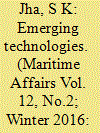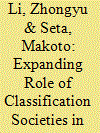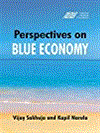| Srl | Item |
| 1 |
ID:
150592


|
|
|
|
|
| Summary/Abstract |
Developments in the field of three-dimensional (3D) printing, autonomous ships and green technologies in recent times have drawn the attention of the shipping world. Each of these technologies has already been through decades of the development phase and now offers diverse applications across sectors. This paper examines each of these technologies from its inception to its impact on the shipbuilding industry, both warship and mercantile marine. Early impacts on shipbuilding are noticeable in refit and repairs, retro-fitments and logistic chain improvements. On-board/next port of call 3D-printed spare parts, tools and accessories are becoming increasingly common. Effective use of this technology to manufacture “one of a kind” steel parts or smaller and complex parts are facilitating substantial cost and time reductions during refits, repairs and retro-fitments. In the run-up to a fully autonomous ship, systems with increased autonomy are available as upgrades. Implementation of green technologies to conform to international regimes is increasing the scope of work of the refits and upgrades. Eventually, as newer hull and system designs mature and complete sea trials, the impact will be felt in new constructions and shipbuilding trends.
|
|
|
|
|
|
|
|
|
|
|
|
|
|
|
|
| 2 |
ID:
188877


|
|
|
|
|
| Summary/Abstract |
Private actors and their roles in conserving the marine environment have attracted increasing attention. Although classification societies were originally designed as industrial organizations developing internal standards on hull and machinery, their contributions to the marine environmental protection should not go ignored. As exemplified by the Ballast Water Management (BWM) Convention, an international shipping instrument on ballast discharge for which the implementation process was subject to technological uncertainties, their contributions can be described in three ways: verification on behalf of states as “recognized organizations”; participation in International Maritime Organization (IMO) sessions; and establishment of their own standards. It is argued that these multiple functions reveal the competence of classification societies to tackle vessel-source pollution, and further, that their technical know-how and firsthand experience accumulated from shipping practice demonstrate their potential to address other complicated marine environmental issues where experience and compliance technologies are essential. However, the expanding focus of classification societies to marine environmental issues should proceed with caution. A much under-discussed point is the impact of classification rules and standards developed by the International Association of Classification Societies (IACS) on international shipping conventions as agreed by states. Though it cannot be said that classification societies are making their own vessel-source discharge standards independent from the IMO lawmaking process, the Unified Requirements on BWM system installation illustrate that obligations under international instruments could be de facto complemented by industrial standards, despite the fact that no provisions incorporating the latter are explicitly spelled out in the former. Given the noticeable lack of state consent throughout the private standard-setting process and the near-universal applicability of IACS standards, legitimacy concerns arise as to whether it is justified for classification societies to wield such an impact on the development of vessel-source pollution requirements, affecting both states and other maritime stakeholders. In this respect, a global administrative law perspective is taken to examine in what ways their legitimacy could be challenged.
|
|
|
|
|
|
|
|
|
|
|
|
|
|
|
|
| 3 |
ID:
151680


|
|
|
|
|
| Publication |
New Delhi, Vij Books India Pvt Ltd, 2017.
|
| Description |
xi, 113p.hbk
|
| Standard Number |
9789385563980
|
|
|
|
|
|
|
|
|
|
|
|
Copies: C:1/I:0,R:0,Q:0
Circulation
| Accession# | Call# | Current Location | Status | Policy | Location |
| 058963 | 333.7/SAK 058963 | Main | On Shelf | General | |
|
|
|
|